Luther’s Small and Large Catechism with Select Commentary (6 vols.)
Digital Logos Edition
Overview
The influence of Martin Luther upon Christian theology and the practices of the church is inestimable. In this collection, you can study the theology that ignited the Reformation and led to the establishment of the Lutheran church, still prominent today with approximately 80 million adherents worldwide. Martin Luther’s small and large catechisms are included along with commentary, exposition, hymns, chants, and Bible verses for memorization. The commentary and exposition provides deeper insight into the Lutheran perspective of basic tenets of the evangelical faith. Some of Martin Luther’s most significant writings are included in this collection along with explanatory articles and supplemental material. Enrich your library with the writings of one of the major leaders of the Protestant Reformation.

- Contains some of Martin Luther’s most influential writings
- Provides commentary and exposition of Luther’s small and large catechisms
- Includes supporting scriptures and explanations for Luther’s theology
- Title: Luther’s Small and Large Catechism with Select Commentary
- Author: Martin Luther
- Volumes: 6
- Pages: 1,417
- Christian Group: Lutheran
- Resource Type: Collected Works
- Topic: Creeds, Confessions, and Catechisms
Individual Titles
- Luther’s Small Catechism with Proof Texts, Additions, and Appendices by Martin Luther
- Luther’s Small Catechism: Developed and Explained by Martin Luther
- Luther’s Small Catechism: Explained in Questions and Answers by Martin Luther
- Explanation of Luther’s Small Catechism, Abridged Edition by Martin Luther, Harold Ulrik Sverdrup, and Erick Pontoppidan
- Luther’s Primary Works: Together with His Shorter and Larger Catechism by Martin Luther
- A Short Exposition of Dr. Martin Luther’s Small Catechism by Martin Luther
This title is included in the following collections
You can save when you purchase this product as part of a collection.
Logos 7 Lutheran Bronze Legacy...
$89.99$89.99Logos 9 Lutheran Bronze Legacy...
$89.99$89.99The Martin Luther Collection (...
$299.99$299.99Logos 8 Lutheran Silver Legacy...
$349.99$349.99
- $349.99
- $349.99
- $849.99
- $849.99
- $849.99
- $1,499.99
- $1,499.99
- $1,499.99
- $2,999.99$2,249.99
- $2,999.99
- $2,999.99
- $2,999.99
- $4,749.99$3,562.49
- $4,749.99
- $4,749.99
- $4,749.99
- $23,999.99$17,999.99
- $21,749.99
- $24,999.99
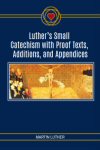
Martin Luther’s small catechism includes sections on the Ten Commandments, the Apostles’ Creed, the Lord’s Prayer, the Sacrament of Holy Baptism, the Office of the Keys and Confession and the Sacrament of the Eucharist. This edition provides proof texts for each thought presented in the catechism, as well as hymns and chants. A chronological summary of biblical history is included to aid the student in reading the Bible as a continuous historical account. Although originally published in 1529, Luther’s Small Catechism remains in use in churches today.
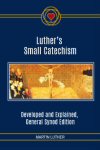
This volume provides additional questions and answers to supplement Luther’s original catechism. It was produced by the General Synod of the Lutheran Church in response to their concerns that catechists were ineffectively using a lecture methodology to expound upon the catechism. The emphasis of this edition of Luther’s Small Catechism is to further develop and teach catechumens through additional questions and answers, not additional lectures. The supplemental material in this edition provides rich insight into the Lutheran perspective of theology and the Bible and further explains some of the basic tenets of the faith.
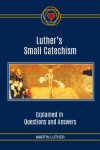
Luther’s Small Catechism: Explained in Questions and Answers expands upon the condensed presentation of the small catechism developing the theology and concepts through additional questions and answers. Additional proof-texts were carefully selected for the catechumen’s reflection and memorization. The additional questions and answers were designed for diverse ages and stages of development among catechumens, making it useful and easily adaptable for teaching all ages. This resource is useful for personal devotional use, Bible study, or sermon preparation.
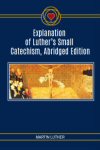
Originally published in 1737, the Explanation of Luther’s Small Catechism became a highly influential and widely read explanation of Luther’s small catechism. The work of Norwegian bishop and university chancellor, Erick Pontoppidan, this volume was used widely in Norway and in the Norwegian Lutheran Church of America. Pontoppidan’s questions and answers expound upon the original catechism, bringing illumination to Luther’s original work. Deepen your understanding of Lutheran theology with this classic explanation of Luther’s small catechism.
Erick Pontoppidan was the bishop of Bergen, Norway from 1748 to 1755 and chancellor of the University of Copenhagen from 1755 to 1764.
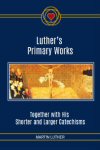
The works selected for this volume were chosen to introduce the reader to the principles that started the Reformation. The larger catechism, in particular, lays out the foundational tenets of Martin Luther’s theology. Luther’s Primary Works includes Concerning Christian Liberty, The 95 Theses, and more.
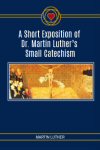
This volume gives additional questions and answers expounding upon Martin Luther’s original teaching. The exposition is supported with several additional texts not cited in Luther’s Small Catechism. It provides a supplement to the succinct teaching of the small catechism—further developing the ideas presented by Luther with explanation and additional biblical support. This resource is useful for sermon preparation, personal Bible study, or for leading catechism.
Martin Luther (1483–1546) was a key figure in the Protestant Reformation and one of the most significant figures in Western history. Over the course of his life, he was a monk, a priest, a professor of biblical literature, a Reformer, a husband, and a father.
Luther is most noted for his 95 Theses (1517), in which he argues that indulgences are not acts of penance which can replace true repentance. In 1520, Pope Leo X and Holy Roman Emperor Charles V demanded that Luther retract all of his writings. Luther refused. He was subsequently excommunicated and declared an outlaw.
Luther has been both praised and vilified for what he preached and wrote. His translation of the Christian Bible into the vernacular greatly influenced the church. His works continue to impact all Christians and animate the movement that bears his name. His works are also represented in Martin Luther’s Basic Theological Writings and the Luther’s Works collection.
Reviews
1 rating

Rev. Robert Sundquist
9/20/2018